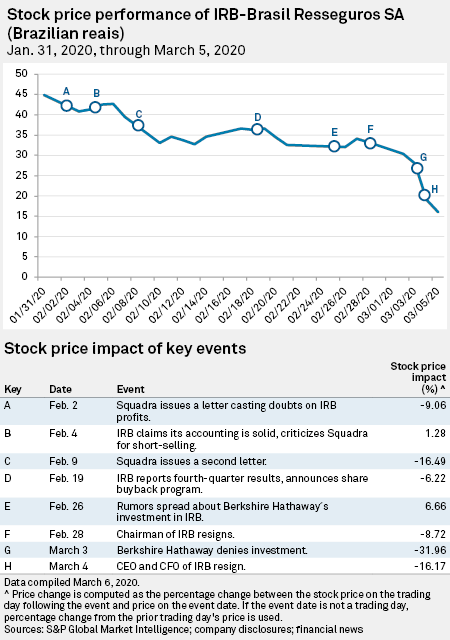“We want your confidence back,” Pedro Guimarães told the investment community shortly after taking over as interim chairman at IRB-Brasil Resseguros SA.
“We had a confidence crisis because of an information,” Guimarães, who is CEO at the state-owned Caixa Econômica Federal, said during a March 5 conference call. “We think the relationship with the market was not good. It’s not acceptable.”
It is a recognition that a few week’s worth of missteps had badly damaged the market reputation of a company that had touted itself the most profitable reinsurance business in the world. It had also spurred top-level management changes, including its CEO and CFO.
“We liked the company numbers and the story they presented,” Luis Sales, an equity analyst with Guide Investimentos, said in an interview. But, he added, “We just don’t believe in them anymore.”
Investors have punished the company’s stock, which has fallen more than 60% since the end of January.

The bulk of the stock pressure has come within the past few weeks. First came reports in late February that Chairman Ivan Monteiro had resigned after seven months in the position because he had become “uncomfortable” with management. IRB initially denied the reports only to confirm the resignation hours later, saying that Monteiro was leaving due to health issues.
The ensuing confusion surrounding the timing and reasoning around the chairman departure rattled markets and spurred an administrative process by CVM, the Brazilian securities commission.
Shortly after, during a conference call with analysts to discuss the chairman change, senior executives appeared to confirm other press reports claiming that Berkshire Hathaway Inc., the U.S. conglomerate controlled by Warren Buffett, had purchased a stake in IRB and would get a board appointment.
Berkshire soon after issued a terse news release to clarify that it “is not currently a shareholder of IRB, it has never been a shareholder of IRB and it has no intention of becoming a shareholder.”
The following trading day, IRB’s stock tumbled more than 30% and the company announced that CEO José Carlos Cardoso and CFO Fernando Passos, who purportedly had made the misleading Berkshire investment comments, were no longer at the company.
The turbulence adds to recent pressure the IRB has been facing from Squadra Investments – Gestao de Recursos Ltda., which in early February revealed that it had shorted IRB stock and claimed that the company was wrongly including one-off items in its recurring pretax profit figures. IRB dismissed the charge, but Squadra responded with a 50-page report laying out its case.
The company’s stock sank as much as 16% in the trading session that followed. All told, IRB’s market cap has lost more than 25 billion reais in value.
It is sudden about-face for a company that was a popular sector pick and whose stock price had more-than quadrupled since its 2017 IPO.
Several analysts, including those at Bank of America and Citigroup, lowered their investment opinions on the company to “neutral” from “buy.” XP Investimentos changed its investment opinion to “under review” from “buy,” while analyst Marcel Campos warned in a note that “all our prior projections are no longer valid.”
“The loss of a chairman, a CFO and a CEO in less than a week is pretty drastic change for the market to digest,” Campos noted.
During the call, Guimarães admitted that “it will take time for markets to regain… confidence.” The company, now led by Werner Süffert as CFO and interim CEO, has launched an internal investigation into the company’s communication errors, while Süffert is reviewing the company’s guidance.
However, regaining that confidence “won’t be easy,” Guide’s Sales noted. “The damage is done and some of this I don’t think they’ll recover from.”
As of March. 6, US$ 1 was equivalent to 4.64 Brazilian reais.
